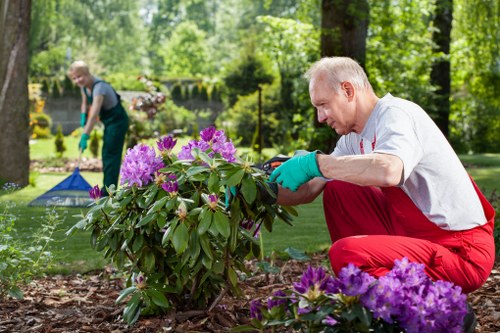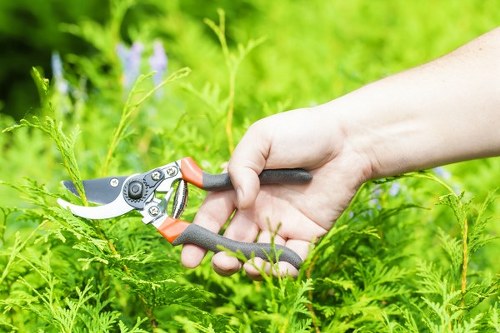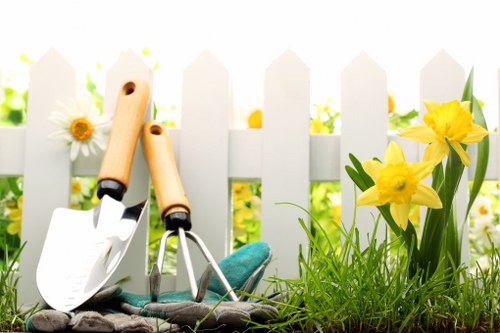Comprehensive Guide to Garden Maintenance in Yiewsley

The Importance of Regular Garden Maintenance
Maintaining a beautiful and healthy garden in Yiewsley requires consistent effort and attention. Regular garden maintenance not only enhances the aesthetic appeal of your outdoor space but also contributes to the overall health of your plants. A well-maintained garden can serve as a peaceful retreat, a place for family gatherings, and a venue for outdoor activities.
Proper garden maintenance involves various tasks such as pruning, weeding, mowing, and fertilizing. Each of these tasks plays a crucial role in ensuring that your garden thrives throughout the year. Neglecting maintenance can lead to overgrown plants, increased pest infestations, and a generally unkempt appearance.
In Yiewsley, the climate and soil conditions can vary, making it essential to adapt your garden maintenance practices to suit the local environment. By understanding the specific needs of your garden, you can implement effective strategies that promote healthy growth and sustainability.

Seasonal Garden Maintenance Tips
Spring Maintenance
Spring is a critical time for garden maintenance in Yiewsley. As the weather begins to warm, it's the perfect opportunity to prepare your garden for the growing season. Start by clearing away any debris that has accumulated over the winter months. This includes fallen leaves, dead branches, and other organic matter that can harbor pests and diseases.
Pruning is another essential task in the spring. Remove any dead or damaged branches from your trees and shrubs to encourage new growth. Additionally, this is the ideal time to plant new flowers, vegetables, and other plants that will thrive during the warmer months.
Fertilizing your garden in the spring provides the necessary nutrients for healthy plant development. Choose a balanced fertilizer that suits the specific needs of your plants, and follow the application instructions carefully to avoid over-fertilization.

Essential Garden Maintenance Tasks
Pruning and Trimming
Pruning and trimming are fundamental aspects of garden maintenance. Regular pruning helps maintain the shape and structure of your plants, promotes healthy growth, and prevents the spread of diseases. When pruning, always use clean and sharp tools to make precise cuts that minimize damage to the plant.
Trimming involves cutting back overgrown branches and stems to ensure that your plants remain healthy and visually appealing. This practice also allows more sunlight and air to reach the inner parts of the plant, reducing the risk of fungal infections.
Lawn Care
A well-maintained lawn is a highlight of any garden. Regular mowing, edging, and watering are essential to keep your grass healthy and green. Mow your lawn regularly, ensuring that you never cut more than one-third of the grass height at a time to prevent stress.
Edging helps define the boundaries of your lawn, giving it a neat and polished appearance. Additionally, proper watering techniques, such as deep and infrequent watering, encourage deep root growth, making your lawn more resilient to drought and other stressors.
Weed Control
Weeds can quickly take over your garden if not managed properly. Implementing effective weed control methods is crucial to maintaining the health and beauty of your plants. Hand-pulling is an eco-friendly option, especially for small gardens. For larger areas, consider using mulches or landscape fabrics to suppress weed growth.
Chemical herbicides should be used with caution, as they can also harm desirable plants. Always follow the manufacturer’s instructions and apply them selectively to target weeds without affecting your garden’s flora.

Choosing the Right Tools and Equipment
Having the right tools is essential for efficient garden maintenance. Invest in high-quality tools such as shears, pruners, lawnmowers, and hoes to make your gardening tasks easier and more effective. Proper maintenance of your tools, including regular cleaning and sharpening, will extend their lifespan and ensure they perform optimally.
Consider ergonomic tools that reduce strain on your hands and wrists, especially if you have a large garden or engage in extended gardening sessions. Additionally, storage solutions like sheds or toolboxes can help keep your tools organized and protected from the elements.
Eco-Friendly Gardening Practices
Adopting eco-friendly gardening practices not only benefits the environment but also promotes a healthier garden. Use organic fertilizers and natural pest control methods to reduce the reliance on chemical inputs. Composting kitchen and garden waste is an excellent way to enrich your soil and minimize waste.
Incorporate native plants into your garden design, as they are well-adapted to the local climate and require less maintenance and water. Implement rainwater harvesting systems to conserve water and ensure a sustainable water supply for your garden.
Pest and Disease Management
Effective pest and disease management is critical for maintaining a healthy garden. Regularly inspect your plants for signs of pests or diseases, such as discoloration, spots, or unusual growth patterns. Early detection allows for prompt treatment, preventing the spread and minimizing damage.
Use integrated pest management (IPM) strategies that combine biological, cultural, and mechanical control methods to manage pests sustainably. Avoid excessive use of chemical pesticides, as they can harm beneficial insects and disrupt the garden’s ecosystem.

Hiring Professional Garden Maintenance Services in Yiewsley
While many garden maintenance tasks can be handled DIY, hiring professional garden maintenance services in Yiewsley can save you time and ensure that your garden receives expert care. Professional gardeners have the knowledge, skills, and equipment to perform maintenance tasks efficiently and effectively.
When selecting a garden maintenance service, consider factors such as experience, reputation, and the range of services offered. Look for reviews and testimonials from other clients to gauge the quality of their work. Additionally, ensure that the service provider is insured and follows sustainable gardening practices.
Benefits of Professional Maintenance
- Expert Knowledge: Professionals understand the specific needs of different plants and can provide tailored care.
- Time-Saving: Outsourcing maintenance tasks frees up your time for other activities.
- Consistent Results: Regular visits ensure that your garden remains in top condition throughout the year.
- Advanced Techniques: Professionals use the latest tools and techniques to enhance garden health and aesthetics.
Cost Considerations
The cost of professional garden maintenance services in Yiewsley can vary based on the size of your garden, the scope of services required, and the frequency of visits. It’s important to obtain detailed quotes from multiple providers and compare their offerings to find the best value for your investment.
Remember that quality garden maintenance is an investment in the longevity and beauty of your outdoor space. While it may seem like an additional expense, the benefits of having a well-maintained garden can significantly enhance your property’s value and your personal enjoyment.
DIY vs Professional Garden Maintenance
Deciding between DIY and professional garden maintenance depends on several factors, including your gardening expertise, the time you can dedicate, and the complexity of your garden. DIY maintenance can be rewarding and cost-effective, especially for smaller gardens. It allows you to learn more about gardening and develop a personal connection with your outdoor space.
However, larger gardens or those with specific maintenance challenges may benefit from professional services. Professionals can address issues that may be beyond your experience, ensuring that your garden remains healthy and attractive. They can also introduce innovative ideas and designs that you may not have considered.
Hybrid Approaches
Many gardeners find that a hybrid approach, combining DIY efforts with professional assistance, works best. You can handle routine tasks like weeding and mowing while hiring professionals for more specialized work such as pruning, pest management, and landscape design.
This approach allows you to maintain control over your garden while benefiting from expert advice and services when needed. It also provides flexibility, enabling you to scale your maintenance efforts based on your schedule and budget.
Maximizing Garden Health and Beauty
Whether you choose DIY or professional garden maintenance, the key to a thriving garden is consistency and attention to detail. Regular care ensures that your plants receive the necessary nutrients, water, and protection against pests and diseases. Additionally, staying informed about best gardening practices and seasonal changes can help you make informed decisions that enhance your garden’s health and beauty.
By prioritizing garden maintenance, you create an inviting and vibrant outdoor space that can be enjoyed by you and your family for years to come. Embrace the process, and watch your garden flourish with dedicated care and thoughtful maintenance strategies.
Tips for Sustainable Garden Maintenance
Water Conservation
Water is a precious resource, and conserving it is essential for sustainable garden maintenance. Implementing efficient watering practices, such as drip irrigation and mulching, can significantly reduce water usage. Drip irrigation delivers water directly to the plant roots, minimizing evaporation and runoff.
Mulching helps retain soil moisture by creating a barrier that reduces water loss. Organic mulches, like wood chips and straw, also improve soil health by breaking down and adding nutrients over time.
Using Native Plants
Incorporating native plants into your garden design is an excellent way to promote sustainability. Native plants are well-adapted to the local climate and soil conditions, requiring less water and maintenance compared to non-native species. They also provide essential habitat and food sources for local wildlife, enhancing the biodiversity of your garden.
Composting
Composting is a sustainable practice that recycles kitchen and garden waste into nutrient-rich soil amendments. By composting, you reduce the amount of waste sent to landfills and improve soil health without relying on chemical fertilizers. Compost can be used to enrich garden beds, promote healthy plant growth, and increase soil fertility.
Reducing Chemical Usage
Excessive use of chemical pesticides and fertilizers can harm beneficial insects, soil health, and water quality. Opt for organic and natural alternatives to manage pests and nourish your plants. Techniques such as companion planting, crop rotation, and introducing predatory insects can effectively control pests without the need for harmful chemicals.
Energy-Efficient Practices
Incorporating energy-efficient practices into your garden maintenance can further enhance sustainability. Use solar-powered lighting for pathways and garden features, and select tools with low energy consumption. Additionally, consider installing rain barrels to capture and store rainwater, providing an eco-friendly water source for your garden.
Common Garden Maintenance Mistakes to Avoid
Overwatering or Underwatering
One of the most common mistakes in garden maintenance is improper watering. Overwatering can lead to root rot, nutrient leaching, and increased susceptibility to pests and diseases. Conversely, underwatering can cause plants to become stressed, leading to poor growth and reduced yields. It’s essential to understand the specific water requirements of your plants and adjust your watering schedule accordingly.
Neglecting Soil Health
Healthy soil is the foundation of a thriving garden. Neglecting soil health by failing to add organic matter or test nutrient levels can result in poor plant growth. Regularly amend your soil with compost or other organic fertilizers, and conduct soil tests to determine if additional nutrients are needed.
Improper Pruning Techniques
Improper pruning can damage plants and inhibit their growth. Avoid cutting too much of the plant at once, and always make clean, angled cuts to promote healing. It’s also important to prune at the right time of year for each plant species to avoid disrupting their natural growth cycles.
Ignoring Pest and Disease Signs
Early detection of pests and diseases is crucial for effective management. Ignoring signs of infestation or infection can lead to widespread problems that are difficult to control. Regularly inspect your plants and take prompt action at the first sign of trouble to prevent escalation.
Poor Plant Selection
Choosing plants that are not suited to your local climate, soil conditions, or garden space can result in poor growth and high maintenance needs. Research and select plants that are well-adapted to the Yiewsley environment and compatible with your garden’s conditions to ensure a successful and low-maintenance garden.
Avoiding these common mistakes can significantly improve the health and appearance of your garden, making maintenance easier and more effective in the long run.
Conclusion
Effective garden maintenance in Yiewsley involves a combination of regular care, proper techniques, and informed decision-making. By understanding the specific needs of your garden and implementing best practices, you can create a vibrant and sustainable outdoor space that enhances your property and provides a sanctuary for relaxation and enjoyment.
Whether you choose to undertake maintenance tasks yourself or hire professional services, consistency and attention to detail are key to achieving a thriving garden. Embrace the seasonal rhythms, invest in quality tools, and prioritize sustainable practices to ensure that your garden remains healthy and beautiful year-round.
Start your garden maintenance journey today and transform your Yiewsley garden into a stunning and flourishing haven.
